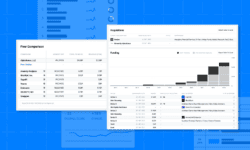In 2020, remote work and return to work were two massive themes among corporate teams. Executives made public comments on their proposed return to office dates, while analysts predicted a new shift to a remote-first world. In fact, Morgan Stanley analyzed over 700 occupations and found that the number of people who could continue to work from home is nearly 30% (with increased numbers in San Francisco [~55%] and New York [40%].)
As we enter 2021, how have executives changed their tone about a return to office in early 2021? And, with vaccines rapidly distributing around the world, are executives hesitant to allow full-time remote employees?
Staying on top of flexible workforce strategies is essential this year. Log in to AlphaSense to track corporate remote work strategies, or sign up for a free trial.
Amazon
Amazon was one of the first large employers to allow remote work when COVID-19 hit the United States. In April, Amazon extended its WFH policy through October 1, 2020, followed by January 8, 2021. This week, Amazon revised its “return to work” date to June 30, 2021.
“We continue to prioritize the health of our employees and follow local government guidance,” a company spokesperson said in a statement. “Employees with work that can effectively be done from home can continue to do that work from home through June 30, 2021. We have invested significant funds and resources to keep those who choose to come to the office safe through physical distancing, deep cleaning, temperature checks, and by providing face coverings and hand sanitizer.”
Facebook plans to keep staff remote until July 2021. Brynn Harrington, VP of People Growth, noted that the company needs its employees to “be successful whether they’re at the office or not. We need to be able to enable teams to work connected in a unified experience.”
To that end, “the remote experience should be the Facebook experience,” Harrington says. Facebook will offer flexible remote options to employees but still anticipates a large return to work this year.
Infosys
Information technology and services company Infosys, plans on having “33%-50%” of its workforce work from home permanently, with a return to work sometime in mid-2021.
“We have to build an environment where the distributed and connected paradox works by facilitating remote collaboration at scale,” the company said in a statement. “We supported distributed remote working for the majority of our workforce, and from our experience, there are many essential ingredients to be remote-first.”
Microsoft
Microsoft is giving its employees the option to work from home through at least January 19, 2021. Microsoft informed employees this week that they will have more flexibility to work from home, even after it’s safe to return to offices.
The new guidelines, allow all Microsoft employees to work remotely less than 50% of the time. Employees can also request approval from their managers to work remotely full time, or even move to a new location, with salaries adjusted based on geography.
Airbnb
Airbnb announced in late Q3 that their employees would be working remotely until at least August 2021, following behind tech giants as COVID-19 continues to spread. With their announcement, Airbnb’s CEO noted that they would be adding a $500 work from home stipend to help with equipment and desk setup.
“While we don’t know when the pandemic will end, we want to provide our employees with flexibility and choice to make decisions about the next year,” the company said in the blog post. “We are offering this remote working extension to give employees the ability to plan further ahead and make the choices they need around school calendars, being closer to family, caring for vulnerable family members, and other personal decisions.”
PayPal
PayPal is a financial technology company with a platform that allows buyers and sellers to securely conduct online transactions. PayPal works with over 179 million merchants and consumers from more than 200 international markets. Remote work plans: PayPal employees will work from home until October 1, 2020.
Shopify
In May, Shopify CEO Tobi Lutke announced a full shift to remote work on social media, proclaiming that the e-commerce tech company is “digital by default” and that “office centricity is over.”
Before COVID-19, most Shopify employees worked in-office, however, Shopify’s CEO expects that the company is leading the charge into the future, where centralized offices will merely serve as a way to help new hires transition to remote working environments.
How will Shopify adapt their office culture in 2021? Track their transition to a fully remote workforce here.
Apple
After stating that employees would return back to work in early 2021, Apple CEO Time Cook informed his staff in December that most teams would not return to office until June 2021.
“There’s no replacement for face-to-face collaboration, but we have also learned a great deal about how we can get our work done outside of the office without sacrificing productivity or results,” he announced in a recent transcript. “All of these learnings are important. When we’re on the other side of this pandemic, we will preserve everything that is great about Apple while incorporating the best of our transformations this year.”
Salesforce
Salesforce employees have the option of working from home through at least August 2021. Previously, all 49,000 employees were allowed to work remotely until the end of 2020.
While Salesforce is slowly reopening its 160 offices around the world based on local government guidelines and the advice of medical experts, extending the work from home option to next summer gives employees the ability to plan ahead, the company said.
Siemens
Siemens, the global industrial electrical engineering and electronics corporation, announced in late 2020 that 140,000 of Siemens’ employees can permanently work from home for two to three days per week.
CEO Roland Busch announced “The basis for this forward-looking working model is further development [of] our corporate culture. These changes will also be associated with a different leadership style, one that focuses on outcomes rather than on time spent at the office. We trust our employees and empower them to shape their work themselves so that they can achieve the best possible results. With the new way of working, we’re motivating our employees while improving the company’s performance capabilities and sharpening Siemens’ profile as a flexible and attractive employer.”
Interested in how 2020’s biggest trends will impact 2021? Download our latest guide “2020 Year in Review: Analyzing a Pandemic-Struck Market”.




